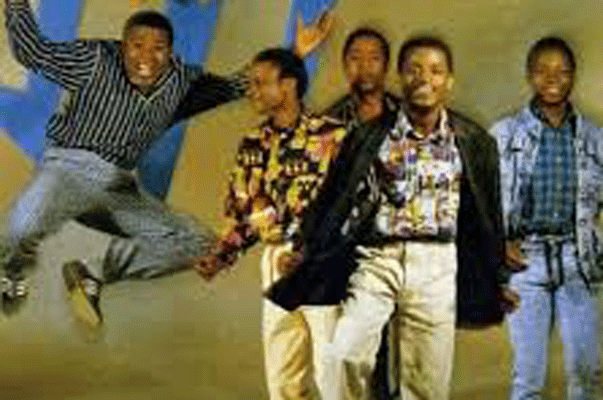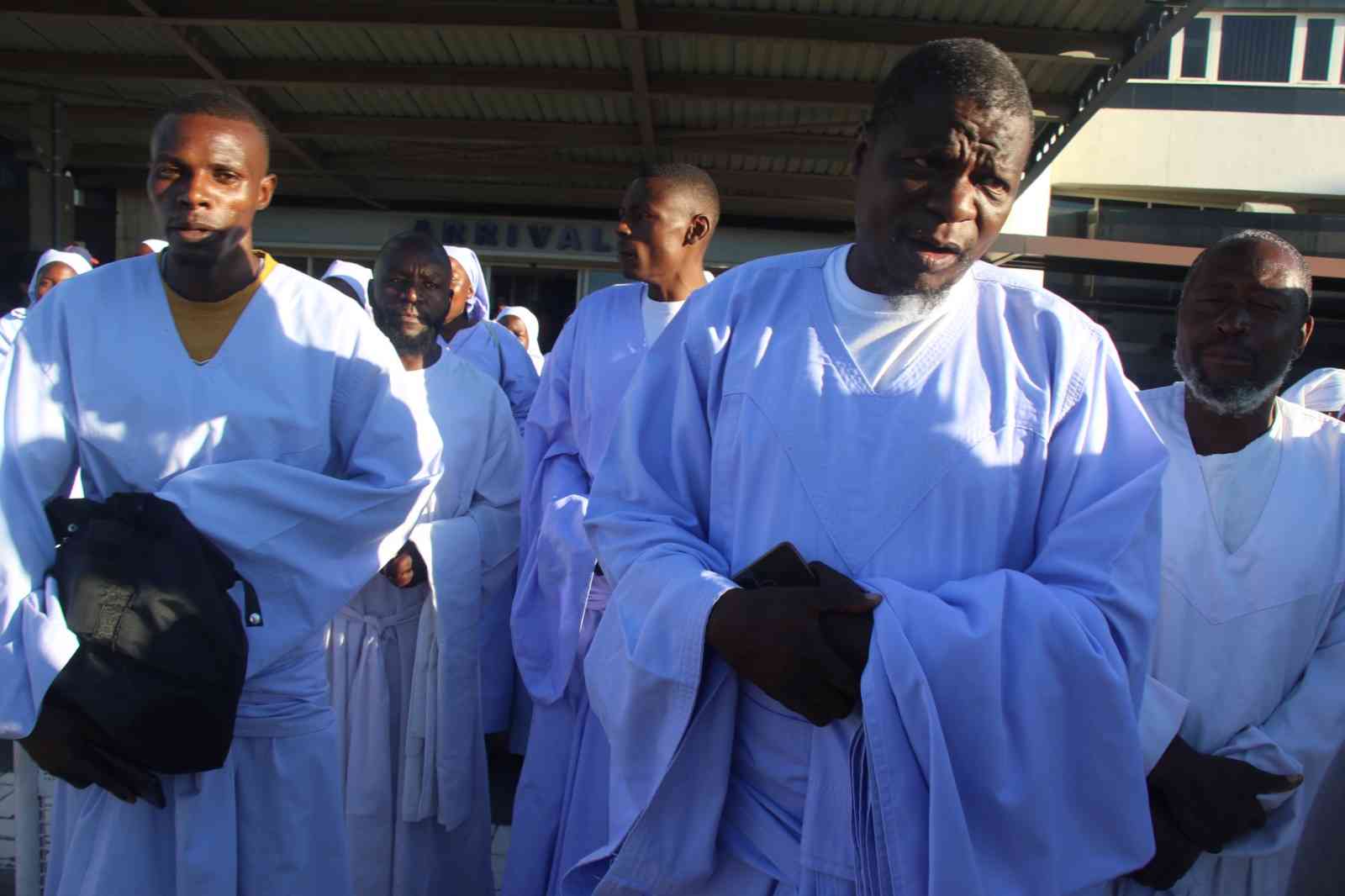
In March 1987, Walton Dangarembizi aka Wala and I were sitting in the downstairs bar at Africa Centre, Covent Garden in London when we were approached by two Scottish men, one named Gordon Muir and the other called Doug Veitch. They asked us, “What would be the best band to bring out of Zimbabwe for a couple of shows in Glasgow?” Wala and I came up with three names — Thomas Mapfumo, Oliver Mtukudzi and Lovemore Majaivana. Then Veitch said, after showing us the Bhundu Boys’ vinyl extended play (EP) with the song Shabhini, “Have you heard of this band?” Yes, I said. Little did we know that they had been given a licence by Shed Studios in Zimbabwe to release the Bhundu Boys’ music under their Disc-Afrique label. Muir then went on to say, “We are thinking of bringing this band to the United Kingdom and the first gig will be here at the Africa Centre”. Indeed within three weeks, the Bhundu Boys were in the UK.
in the groove with Fred Zindi

I attended their first London gig at Africa Centre. Despite massive publicity over a period of three weeks, only a dozen people got into the show. Muir and Veitch, who were both based in Hawick, Scotland and had no accommodation in London, had expected a larger turnout. As a result, after the gig with only £60 collected at the gate and a whole heap of expenses plus six band members to look after, they were stranded. I suggested that Muir, Veitch, David Mankaba and Rodwell Marasha aka Biggie Tembo book into a cheap bed and breakfast accommodation while I would take the rest of the band — Rise Kagona, Shakie Kagwena, Kenny Chitsvatsva and Shepherd Munyama to my two-bedroomed flat where they all squeezed into one bedroom.
After their first experience, the Bhundu Boys were prepared for the hard times. They would play in small pubs and clubs, sometimes for £50 a night to the extent that after one year with close to 300 performances, they were declared the hardest working band in the UK. They appeared in most of the UK newspapers, The Daily Mirror, The Sun, The Star, Melody Maker, Musical Express, The Voice and even The Guardian.
With that publicity, the tables began to turn. Music promoters began to notice them and they were invited to appear at many festivals such as Womad (World of Music and Dance), Glastonbury Festival, Scottish Heavy Beat Festival, UK Summer Festival and Bristol Festival.
The odd circumstances which brought the band international fame began around 1985 at a squat in a disused hospital at Earl’s Court, London where Owen Elias — a student at Chelsea College of Art — met Veitch, maverick Scottish guitarist whose supplementary sources of income included driving tube trains and cleaning windows. Using the £2 000 then gifted to new businesses under the Enterprise Allowance Scheme, Elias and Veitch formed a label which they called Disc Afrique and left for Harare to look for artists. There, Steve Roskilly of Shed Studios played them the songs they issued on the EP that would captivate veteran BBC Radio DJs, the late John Peel and Andy Kershaw.
It was when Elias and Veitch decided to take the band to the UK in 1986 that things became increasingly surreal. Unable to fund a tour, they turned to Muir, a designer of knitwear brochures who grew up with Veitch in the border town of Hawick. Muir provided the cash and was soon the manager of the band. He got the band bookings on the lucrative student circuit, from which base, with the support of radio DJs such as Peel, Kershaw and Charlie Gillett, they built a national following.
At the height of their fame in 1989, the Bhundu Boys were signed to Warner Records (WEA), the same label which had also signed the likes of Madonna, Prince, Al Jarreau, Chicago, The Everley Brothers and Hugh Masekela. They toured North America, Australia and Hong Kong, chauffeured to venues from luxury hotels. With advance royalties from WEA, they bought a large house in London.
- Chamisa under fire over US$120K donation
- Mavhunga puts DeMbare into Chibuku quarterfinals
- Pension funds bet on Cabora Bassa oilfields
- Councils defy govt fire tender directive
Keep Reading
Peel famously described the Bhundu Boys as producing “the most naturally flowing music he’d ever heard in his life”. Kershaw was the best man at Biggie Tembo’s wedding in Zimbabwe where Zimbabwean artists, Oliver Mtukudzi and Newman Chipeni performed.
In England, Tembo won the Sony Award for a superb Radio 1 documentary that he co-presented with Kershaw, hosted a special for Channel 4 and appeared on the television programme, Blue Peter. The Bhundu Boys were lauded by Eric Clapton and Mark Knopfler of the Dire Straits band, as well as Madonna, who personally requested that the band support her for the three nights she played to a total of 240 000 people at Wembley Stadium. Elvis Costello, another admirer, briefly acted as their producer. At Brixton Academy, the Bhundu Boys were joined on stage by Mark Knopfler and headlined a show which was supported by Hugh Masekela. No other musician from Zimbabwe has achieved the level of success experienced by the Bhundu Boys. The trick, I am sure, was the fact that they were prepared for hard times and that they stayed in Europe for the longest time.
Mokoomba, another Zimbabwean group which is currently making waves in Europe, is still yet to scale the heights reached by the Bhundu Boys.
At the height of his success in 1989, Biggie Tembo, one of the most convivial and engaging men in the band, bought a four-bedroomed house with a swimming pool in an affluent suburb of Hillside in Harare where he lived with his wife, Ratidzai.
As is often the case in the music business, it was when the band became so popular that things went terribly wrong. Biggie Tembo became big-headed as their reputation grew even bigger. One evening, after the Brixton show, he said to me, “Can you believe it! A mere garden boy from Chinhoyi commanding 5 000 whites to ululate when I shout mhururu-mhururu”.
His behaviour, according to Muir, became unpredictable. He said Tembo began to think he was bigger than the band. He gave details of the singer’s affairs with a number of women. He said when Biggie Tembo left the band in 1989, he said unprintable words.
Biggie Tembo was fired from the Bhundu Boys and he found that reflection very difficult to deal with. At almost the same time, he discovered for the first time that the man who brought him up as his son in Chinhoyi was not his biological father. These two things knocked him sideways. He was subsequently admitted in a mental hospital in Chinhoyi. He said: “I cannot deal with this. This has been such a shock”.
In 1997, distraught at having left the Bhundu Boys under acrimonious circumstances, he was found hanged in the psychiatric unit of Harare Hospital. He was 37.
Feedback: [email protected]










